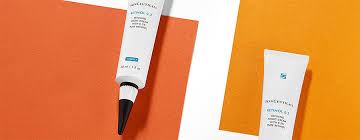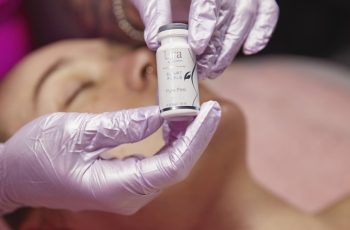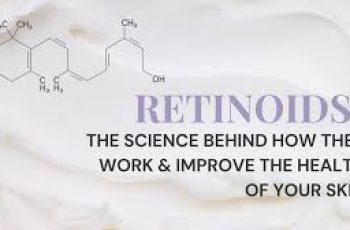Demystifying Retinol
Retinol is another name for vitamin A. It is a type of retinoid, a family of compounds related to vitamin A. Other retinoids include retinoic acid, retinal and retinyl palmitate.
In addition to being a proven acne treatment, retinol is also known for its anti-aging properties. Retinol increases cell turnover, cleans pores, and reduces the appearance of fine lines and wrinkles.
Retinol is now available as an over-the-counter serum, face cream, and restorative night cream. People can easily incorporate them into their skin care routine because they contain extremely low concentrations of retinol,
which gently improves skin quality over time.
In general, there is a lot of misinformation about retinol, mostly due to not knowing the exact type. All retinols are retinoids, but not the other way around. Retinoids have a higher rate of cell turnover and are therefore
useful in the treatment of unresponsive acne or severe acne conditions. Retinol, on the other hand, induces controlled cell turnover that subtly rejuvenates the skin.
How to Buy Retinol Products. There is no such application specificity for Indian skin or gender specifications. The only thing you need to know before using a retinol product is if your skin is overly sensitive, overdry, or
overly irritated.
What to Look for When Buying Retinol Products. Start with a small amount. Too much too soon can cause dry skin and excessive peeling. Always use sunscreen when using these products.
Buy products that are recommended by a dermatologist, as not all retinols are effective. In this regard, decisions about retinoids are best left to your doctor, as using the wrong strength, large amounts, or not using them when
needed can further damage the skin.
<
Before purchasing any retinol-based products, it is recommended that you have a skin examination by a qualified skin specialist. It’s not only helpful to know if these products are helping improve skin texture, but also to rule
them out when you don’t need them.
With all the alluring creams and serums on the market, without understanding your skin type and the products you choose, your complexion may end up only getting worse. Therefore, professional evaluation is the first step in
deciding on retinol treatment.
Retinol is best taken at bedtime, as most of the healing and repairing effects of the skin occur at this time. This is also the time of day when a person is free from other harmful environmental effects such as sun damage, dust,
pollution, heat/cold waves, etc.
DQH Can I use salicylic acid first and then vitamin C?
It’s easy to create a skincare routine, but knowing how to use it is another thing entirely. In most cases, if you’re not getting the desired skin results, it could be due to the layering of conflicting ingredients. So, is it possible that salicylic acid and vitamin C are such ingredients? Or are these active ingredients the duo that’s been missing from your skincare routine? If you want answers, stick around because today we are going to explain the benefits of salicylic acid and vitamin C and how they can be used in your daily life.
What are the benefits of salicylic acid for skin?
Salicylic acid is one of the most commonly used beta hydroxy acids and is favored by many people with oily, acne-prone skin. This acid is derived from willow bark, and unlike its water-soluble relatives (called alpha-hydroxy acids), salicylic acid is oil-soluble, which means it can penetrate deeper into the lower layers of the skin. Once it reaches the lower layers, it can help unclog pores of excess sebum, dirt, bacteria, debris, and impurities. This results in clearer skin tones and greater definition.
Not only does salicylic acid benefit the underlying layers, but the outer surface of the skin benefits as well. When applied to the skin, salicylic acid removes the buildup of dead skin cells. This is accomplished by breaking the bonds that hold dead cells to the surface. Over time, this can cause the complexion to look dull and prone to acne, blackheads, and other blemishes.
If you’d like to learn more about salicylic acid and how it can improve your skin, check out this dedicated blog post from a beauty insider.
What are the benefits of vitamin C for skin?
Vitamin C is considered one of the most powerful antioxidants, which means it is very effective at fighting free radicals and preventing them from causing further skin damage. Examples of free radicals include pollution, central heating, UV rays and harsh climate. They attack proteins, fats and cell membranes as soon as they come into contact with the skin, causing signs of premature aging such as fine lines and wrinkles as well as hyperpigmentation, flaky patches of skin and loss of elasticity.
Many people usually prefer to use vitamin C in their morning routine as this ingredient gives the complexion a radiant glow. You’ll also find that vitamin C can target areas of hyperpigmentation, plumping the skin and reducing the appearance of fine lines and wrinkles.
The thing about vitamin C is that there are a lot of outdated studies going back to the 1950s that describe vitamin C as an unstable skin component. Thanks to improvements in modern technology, this is no longer the case as all products now contain a stable form of vitamin C.
Visit The Beauty Insider to learn more about vitamin C. So please check out our blog post.
Can I use salicylic acid first and then vitamin C?
Yes, you absolutely can. In fact, it’s thought that using salicylic acid before using vitamin C ensures it penetrates faster and works faster.
This is an efficient way to utilize two power sources, and the reason has to do with pH. For example, the skin’s natural pH is about 4.7, making it slightly acidic. Salicylic acid and vitamin C are also both acidic, and you’ll find that vitamin C is absorbed quickly into the skin. Therefore, using salicylic acid beforehand can increase the acidity of the skin and allow vitamin C to penetrate into the skin faster.
While this is considered an effective way to combine two powerful ingredients, you need to be aware of your skin type and how it reacts to certain active ingredients. Even people with perfect, normal skin can experience skin sensitivity and irritation. Therefore, always consult a doctor or dermatologist before using any new products on your skin.
It’s also important to follow skin application rules. In this case, you need to use the product correctly to ensure you get the best results for your skin. If you’re not sure what I mean, the basic rule for skin is to start with the thinnest consistency and work your way up to the thickest consistency. This prevents a barrier from forming on the surface, preventing other active ingredients from penetrating the skin.
Can I use salicylic acid at night and vitamin C in the morning?
Yes, absolutely, this is considered the most effective way to get returns without any adverse side effects. This is because there is enough time between applications to ensure that the skin’s pH levels return to balance.
You’ll also find that Vitamin C is rich in antioxidants and is perfect for use in the morning to ensure your skin is protected and looking its healthiest. Due to the small size of salicylic acid molecules, it is an acid that is able to reach the deepest parts of the skin. While this is effective at keeping skin clear, it also increases the risk of irritation and photosensitivity. Therefore, many people prefer to use powerful BHAs in their evening routine without exposure to UV rays, pollution, or harsh weather.
Warning: If you avoid using sunscreen every day, none of these ingredients will do what your skin needs. The combination of chemical peels and powerful ingredients increases the risk of further damage to the skin’s surface. Use SPF 50 every day to keep your skin protected and your lipid barrier healthy, even on cloudy days, keeping your skin in top condition.



